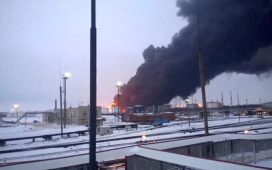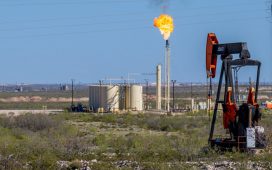
LOS ANGELES, CALIFORNIA – SEPTEMBER 13: The downtown skyline is partially obscured by smoke from … [+]
In the pre-1973 era, energy security often referred to fears that a strike by coal miners would disrupt utility power generation, and utilities kept large coal stockpiles in anticipation of such an occurrence. After 1973, energy security policies were aimed at deterring an oil embargo, and the IEA’s principal mission (in the view of the United States, the prime target of the oil embargo), wanted other countries to share their oil in case of a future embargo.
The Iranian Oil Crisis in 1979 did not involve an embargo but rather domestic political instability in an oil exporting country, made much worse by hoarding (a.k.a. inventory building), and in response many nations increased emphasis on strategic stockpiles to provide surge capacity. Expectations of future disruptions were focused almost entirely on the Middle East, and the loss of Saudi oil supply, possibly along with a neighbor’s, was considered the biggest threat. The first Gulf War seemed to confirm this, but the failure of prices to spike as in previous crises was reassuring.
Then came the 2000s, when supply was lost from Iraq (Gulf War II), Iran (sanctions), Libya (the Arab Spring), and Venezuela (the 2002 strike against the president, and subsequent downward spiral), which left prices over $100 a barrel for much of a decade. (Although many peak oilers insisted the problem was not political developments, but geological scarcity.) Oil consumers were nibbled to death by ducks, as it were, not one massive political crisis, but the damage was felt all the same.
Now, many argue that embracing renewable energy will provide energy security because it is primarily produced locally or at least within a nation’s borders. True, solar panels and wind turbines are often imported, but an embargo on solar panels or wind turbines would have a minimal and gradual impact on energy production in the short term. The same with any disruption of rare earth minerals, needed in most renewable technologies, but not as fuel rather as components, meaning production would be unaffected, but maintenance and expansion reduced.
Thus, the problem of geopolitical instability of energy supplies would seem to be solved, especially to advocates of renewable energies. Unfortunately, as the recent wildfires on the West Coast demonstrated, renewable power has its own vulnerabilities. But close observers of energy know this is hardly the first time that natural events have affected energy supply. For example, French nuclear power has never been reduced by international political developments, but domestic weather has done so, when droughts cut river flows needed to cool the reactors.
Which is not to say that fossil fuel generators are immune to such; gas turbines are less productive in high temperatures, and England recently found that its gas turbines couldn’t offset the loss of wind power for that reason last month, and it was necessary to turn on some coal generation.
There is also a risk from over-reliance on any one source of equipment, since they could be prone not necessarily to coincident failure but shutdowns for defects. Granted, it is hard to imagine a technological flaw or accident that would see all wind turbines or solar panels shut down the way Japan closed all of its nuclear power plants after the Fukushima incident, although the political vulnerability of rare earth minerals production should not be disregarded. And the potential for cross-border electricity integration to result in political disruptions should not be ruled out (see Russia gas sales to Ukraine). But overall, it seems that planners to take Reagan’s “Trust but verify” slogan to heart, at least insofar as they should, “Trust but diversify.”








